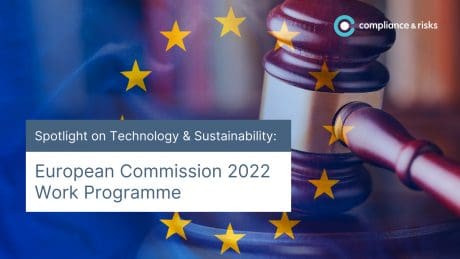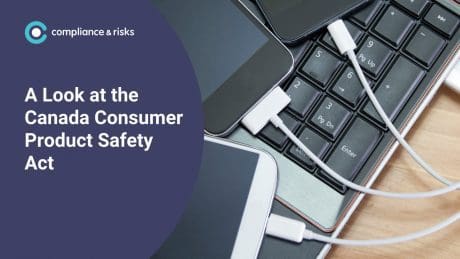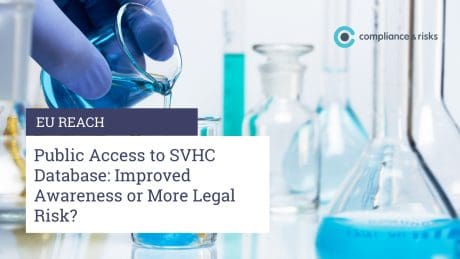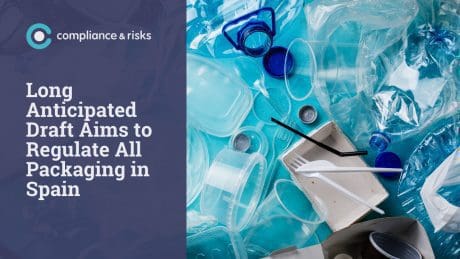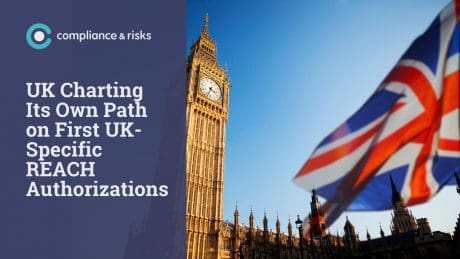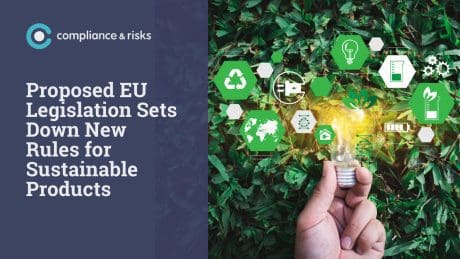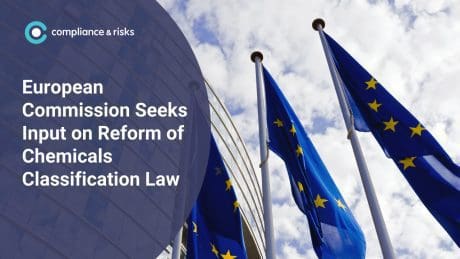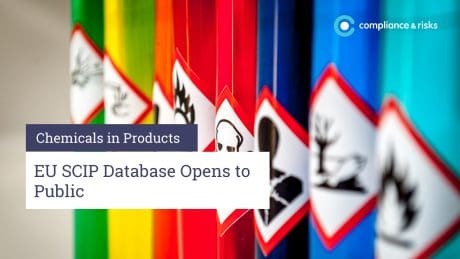
COVID-19 Regulatory Developments: Update 5

The outbreak of the COVID-19 pandemic has resulted in countries adapting their regulatory landscape to accommodate and mitigate the unprecedented disruptions to companies and individuals. Through regular updates, Compliance & Risks will closely monitor the situation and inform our clients of the latest global regulatory developments in relation to COVID-19 relevant to their topics, along with updates on items which may be of interest outside our topics.
Impact to Chemicals Management
On 17 April 2020, Thailand’s Department of Industrial Works (DIW) notified private operators that requests and notifications in relation to hazardous substances shall be submitted online via the Hazardous Substance Permission System. This temporary change in submission procedure concerns the following documents and formalities, among others:
- Application for registration of hazardous substances
- Request for renewal of hazardous substances registration certificate
- Request for a permission to manufacture hazardous materials
- Notification of processing of hazardous substances of type 2
- Request for a permit to produce, import, export or possess hazardous substances of type 2
- Renewal of declaration receipts for the operations concerning with hazardous substances of type 2
Operators are encouraged to apply for a membership via the Hazardous Substance Permission System hosted by DIW and to follow the corresponding application instructions.
Impact to Product Safety and Certification
The Chilean Superintendence of Electricity and Fuels (SEC) has issued Resolution No. 32354 to postpone the entry into force of numerous safety and energy efficiency Testing Protocols for Certain Electrical and Fuel Related Products.
Energy Efficiency
The Pandemic has inevitably hampered many ongoing or scheduled conformity assessment procedures requiring on-site verification visits and testing. On 17 April, the South Korean Ministry of Trade, Industry and Energy (MOTIE) issued an amendment to the Regulation on Energy Efficiency Labeling and Standards to allow the Efficiency Management Testing Agency to deliver test reports exclusively on the basis of an examination of product testing data and documents submitted by manufacturers or importers.
EH&S: Environment
Policymakers have been keen to expand the scope of their actions in response to COVID-19 to encompass Environmental, Health and Safety policy areas. As discussed in our previous update, the EU is increasing its arsenal of guidance documents to assist waste management companies and municipalities with ensuring the continuity of their services, from collection to final treatment and recycling of waste. To help Member States and the waste management sector cope with the disruption, the EU Commission issued a guidance on waste management in the context of the coronavirus crisis. Less immediate but no less important, the EU Commission published a second guidance document on shipment of waste in the EU during the Pandemic. The Commission highlighted that the purpose of this guidance is to facilitate cross-border movement of waste while ensuing ‘a common approach to securing the continuation of waste shipments across the EU’. As such, the guidance discusses practical aspects such as electronic exchange of documentation and information and recommends fast-tracked shipment notification and consent procedures in the context of COVID-19.
COVID-19 prompted the French Ministry of Ecological Transition to reconsider the conditions under which private operators of facilities with pressure equipment may extend the deadline to carry out certain periodic controls and inspections. Based on Ordinance No. 2020-306 on the extension of expired deadlines and adaptation of procedures during the health emergency period, a Ministerial Order dated of 9 April 2020 temporarily authorizes the deadline for periodic controls and inspections to be extended by six months following the expiry date of the health emergency state initially scheduled on 24 May 2020.
The UK’s Environment Agency is regularly publishing a series of Regulatory Position Statements (RPS) in response to COVID-19. The seventh COVID-19 RPS applies to monitoring emissions from installations, radioactive substances and waste activities. It authorizes holders of installation, waste and radioactive substances activity permits to delay or cancel periodic monitoring if they comply with the conditions set out in the COVID-19 RPS. Businesses seeking to rely on this RPS should obtain written approval from the Agency. Similarly, the Environment Agency has loosened the deadlines for submitting certain data, environmental reports and other records specified in environmental permits for installations, waste operations or radioactive substances activities. The new time limits for submitting data, records and environment reports have not been specified by the Environment Agency. Site operators shall contact their Environment Agency area regulatory officer to define specific arrangements. The conditions are set out under the Guidance on Reporting for Installations, Radioactive Substances and Waste Permits.
Packaging
The UK‘s Environment Agency released updated guidelines for the registration of packaging producers. In these guidelines, the Agency announced that no enforcement action or late charges will be taken against packaging producers who have been unable to register by the mandatory deadline (7 April 2020), or have registered but have not provided accurate or complete information. Obligated packaging producers are encouraged to register as soon as reasonably practicable but no later than 7 July 2020. No enforcement action will be taken provided that packaging producers comply with the limitations and conditions set out in these guidelines.
Impact to Data Protection
In addition to the ‘toolbox’ and guidance document on the use of tracing and warning mobile applications in relation to data protection (published last week by the EU Commission), the European Data Protection Board issued the following guidelines:
- Guidelines 03/2020 on the processing of data concerning health for the purpose of scientific research in the context of the COVID-19
- Guidelines 04/2020 on the use of location data and contact tracing tools in the context of the COVID-19 outbreak
The Irish Data Protection Commission also released guidance on certain related implications for GDPR and data subject requests.
In Brazil, the Federal Senate is developing a Bill to implement a special emergency regime in the context of COVID-19. Among other things, the Bill proposes to defer the entry into force of the Brazilian Data Protection Law No. 13.709/2018 until 1 January 2021. The entry into force of certain provisions relating to administrative fines and sanctions may be postponed until 1 August 2021.
Single-use Plastics
COVID-19 has halted much of the recent momentum made in tackling the issues associated with single-use plastics. Public policy has instead begun to focus on fears of the virus transmitting through reusable alternatives to plastics, as well as alleviating any potential burdens placed on consumers and industry. This has resulted in the partial rolling back of several recently adopted measures.
In the United States, several local and state governments have moved promptly to roll back restrictions on plastic bags. Both the states of New York and Maine have delayed the implementation of their recently adopted plastic bag bans to 15 June 2020 and 15 January 2021, respectively. Connecticut has moved to temporarily suspend the mandatory fees applied to plastic bags while states such as Massachusetts have instructed the suspension of such fees applied by its municipal districts. The Governor of New Hampshire has prohibited the use of reusable bags indefinitely within his State casting a shadow over the prospective approval of House Bill 102, 2019 anytime soon. As for US cities, Philadelphia has also moved to delay its prospective ban with Denver signaling that it could take similar action. Similar measures have also been taken in the cities of San Francisco, Albuquerque, and Chicago.
In the EU, there has been industry push back against the prospective implementation of the Single-use Plastic Directive No. 904/2019. Industry groups have sought to delay its date of enforcement for at least an additional year at national level, and to lift all bans on some single-use plastics items. However, the EU Commission has been steadfast in its response, stating that deadlines in EU law must be respected. Therefore, we can expect to see the steady implementation of the Directive across Member States by its original deadline of July 2021.
Elsewhere, COVID-19 has led many policymakers to extend their consultation periods for several ongoing single-use plastic initiatives. Canada has extended the consultation deadline for its Draft Science Assessment of Plastic Pollution Report until 1 May 2020. Additionally, Queensland has extended the consultation period for its prospective single-use plastics legislation until 30 April 2020.
Carbon Footprinting
The Federal Government of Canada published a notice to announce the intent to amend the Output-Based Pricing System Regulations under the Greenhouse Gas Pollution Pricing Act. Recognizing that COVID-19 makes reporting and compliance more challenging for company operations, the Minister of Environment is considering extending the deadline for submitting annual emission reports under the OBPS Regulations from 1 June to 1 October 2020. The amending regulations also propose to defer the deadlines to provide compensation for the GHG emissions emitted in excess of a covered facility’s emissions limit in 2019. The new deadline for regular-rate compensation for the 2019 compliance period would be extended from 15 December 2020 to 15 April 2021. The increased-rate compensation deadline would also be postponed from 15 February to 15 June 2021. If approved, these regulations will apply retroactively with effect from 8 April 2020.
Transport of Dangerous Goods
On 19 April 2020, the Indian Ministry of Commerce and Industry issued a notice clarifying that UN certificates issued by the Indian Institute of Packaging to certain manufacturers of packaging materials for the carriage of dangerous goods will remain valid until 1 June 2020. The extension of validity concerns certificates that expire between 15 March 2020 and 3 May 2020. It is advised that exporters of dangerous goods apply for further extension as per the regular procedure after normalization of the situation and re-opening of the Indian Institute of Packaging.
Developments for Medical Supplies
The European Association of Chemical Distributors (FECC) joined the European Chemical Industry Council (CEFIC) to develop Practical Guidance on Fast-Tracking the Supply of Disinfectants to ensure the fast-tracking of market access for biocidal products under the EU Biocidal Product Regulation during COVID-19. The Guide primarily addresses biocidal products falling under the BPR product-types 1 (Human hygiene) and 2 (Disinfectants and algaecides not intended for direct application to humans or animals). It sets out the list of all biocidal active substances approved or under review for use in disinfectants. It also describes the procedures available for fast-tracking the placing on the market of disinfectants and provides an overview of derogation measures adopted in Member States under the BPR or national laws.
In addition, the European Commission welcomed the adoption by the European Parliament and the Council of the proposal to defer by one year the date of application of the Medical Devices Regulation. This will allow all key players – Member States, health institutions and economic operators to give priority to the fight against the ongoing pandemic, forming a key position in the timing of the lifting of confinement measures as Member States begin the road to recovery. The Commission adopted the proposal on 3 April, and this was followed by the support of the European Parliament on 17 April. As a final step, yesterday the Council has voted to adopt the proposal and it will enter into force upon publication in the Official Journal of the European Union.
The European Commission has developed a series of Guidance and Regulations to make the exportation of Personal Protective Equipment subject to prior export authorization. Please note that all EU policy activities in relation to COVID-19 can be tracked here. A webpage has been set up to help follow and synthesize the EU response to COVID-19.
As discussed in our previous update, the European Committee for Standardization (CEN), CENELEC together with IEC and ISO have agreed to make freely available a series of International (ISO and IEC) and European standards for critical care ventilators and protective equipment. Since then, the EU Commission enacted implementing measures on harmonized standards for medical devices, in vitro diagnostic medical devices and active implantable medical devices.
In Latvia, the Ministry of Health issued a draft Regulation to amend and simplify the procedures for registration, conformity assessment, distribution and technical supervision of medical devices.
The Vietnamese Quality Standards Institute (General Department of Standards, Metrology and Quality) announced the free access to certain national and international standards in the field of risk management, quality management systems and conformity of medical equipment such as ventilators, respirators and protective masks.
In the United States, the Food and Drug Administration (FDA) is proactively seeking to stamp out the progress of the pandemic through numerous policy guidance documents. This month, the FDA released useful guidance to help expand the availability of general use face masks and particulate filtering face piece respirators (including N95 respirators) for health care professionals. While the guidance document is being implemented immediately, the FDA has deemed it prudent to immediately implement this guidance without prior public consultation.
Policy guidance has been issued to increase the availability of surgical apparels for health care professionals. This policy is intended to remain in effect only for the duration of the state of public health emergency. Finally, the FDA published further policy recommendations to industries regarding ‘post-marketing adverse event reporting’ for drugs, biologics, medical devices, combination products, and dietary supplements. This new material discusses the FDA’s ‘intended approach to enforcement of adverse event reporting requirements for medical products and dietary supplements’ in the face of limited resources and workforces.
